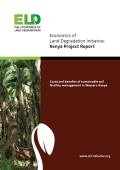
Kenya’s soils are being degraded through suboptimal land management practices, causing declining yields and deterioration of land quality. Sustainable Land Management (SLM) practices can improve soil quality and enhance crop yields. Increasing evidence from the literature highlights the benefits from SLM, but for land users to adopt these practices requires...
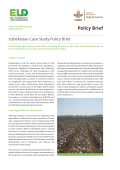
Independence from the former Soviet Union in 1991 presented the republics of Central Asia, Kazakhstan, Kyrgyzstan, Tajikistan, Turkmenistan, and Uzbekistan, with severe challenges for land management with ensuing economic, social, and environmental crises. Driven by the historic development of irrigation projects, often unsupportable increases in livestock numbers on rangelands, and...

Independence from the former Soviet Union in 1991 presented the republics of Central Asia, Kazakhstan, Kyrgyzstan, Tajikistan, Turkmenistan, and Uzbekistan, with severe challenges for land management with ensuing economic, social, and environmental crises. Driven by the historic development of irrigation projects, often unsupportable increases in livestock numbers on rangelands, and...
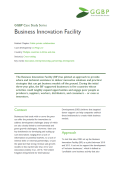
The Business Innovation Facility (BIF) has piloted an approach to provide advice and technical assistance to deliver innovative solutions and practical strategies that can get business models off the ground. During the initial three-year pilot, the BIF supported businesses in five countries whose activities could tangibly expand opportunities and engage...
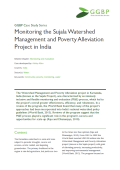
The Watershed Management and Poverty Alleviation project in Karnataka, India (known as the Sujala Project), was characterised by an intensely inclusive and flexible monitoring and evaluation (M&E) process, which led to the project’s overall greater effectiveness, efficiency, and robustness. In a review of the program, the World Bank found that...
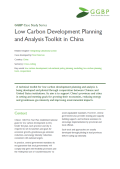
A technical toolkit for low carbon development planning and analysis is being developed and piloted through cooperation between Chinese and United States institutions. Its aim is to support China’s provinces and cities in setting and meeting goals for growing their economies, reducing energy and greenhouse gas intensity and improving environmental...
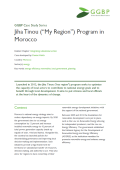
Launched in 2012, the Jiha Tinou ("my region") program seeks to optimise the capacity of local actors to contribute to national energy goals and to benefit through local development. It aims to put citizens and local officials at the heart of the dynamics of change.
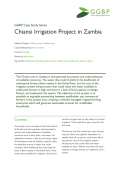
The Chiansi area in Zambia is characterised by poverty and underutilization of available resources. The water that could transform the livelihoods of subsistence farmers flows nearby in the Kafue River, but the cost of the irrigation system infrastructure that could make this water available to small-scale farmers is high and...
A growing number of countries at all levels of development have legislation or regulations prescribing the application of Strategic Environmental Assessment (SEA) - and many more are introducing it as part of their policy tools. This is creating unique opportunities for better policy making and planning by incorporating environmental considerations...
Renewable energy together with energy efficiency, sustainable transport, sustainable agriculture, sustainable tourism, green building and waste management are economic sectors which are often considered capable of paving the way for a transition to a green economy and providing win-win solutions offering job creation, poverty alleviation and environmental protection. However, there...
